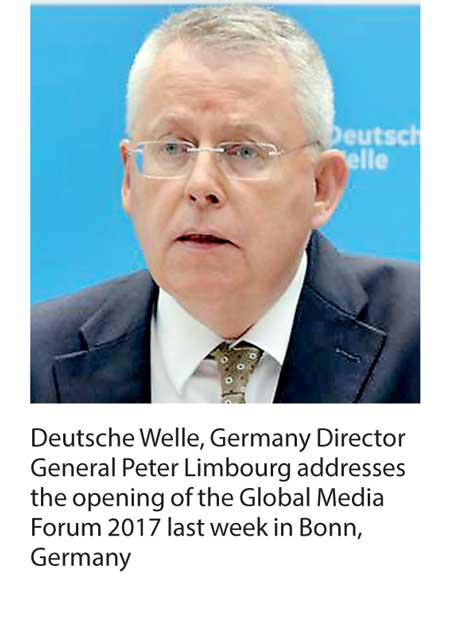Wednesday Feb 25, 2026
Wednesday Feb 25, 2026
Friday, 30 June 2017 00:00 - - {{hitsCtrl.values.hits}}
 “I have a message for all despots, autocrats and dictators: You will not oppress freedom of speech forever. Freedom of speech is stronger than you.” With these words, DW Director General Peter Limbourg opened the GMF.
“I have a message for all despots, autocrats and dictators: You will not oppress freedom of speech forever. Freedom of speech is stronger than you.” With these words, DW Director General Peter Limbourg opened the GMF.
Nearly 2,000 experts from over 100 countries met at the World Conference Center Bonn from June 19-21 for the Global Media Forum (GMF), coordinated by Germany’s international broadcaster Deutsche Welle. They discussed politics and human rights, media development and innovative journalism concepts.
“Any ruler who chokes freedom of the press will fail in the long run. People want more than prosperity and security – they also want freedom and justice. That is what we at DW are working for,” said Limbourg at the opening of Deutsche Welle’s tenth annual media conference. The theme of this year’s conference is “Identity and Diversity.”
As crises and conflicts are increasing, so, too is the importance of international broadcasters, Limbourg said. Only those who are viewed as trustworthy would prevail in the long run. “This entails a growing responsibility for comprehensive, objective reporting. International broadcasters can never take sides. With only one exception: When it comes to human rights.”
The task of the media is to keep people informed, and “to enable them to make better decisions based on our information, to improve their understanding of the world. To make one thing absolutely clear: The media are not the enemy of the people – we are working in the people’s interest!” said the director general of Germany’s international broadcaster.
Limbourg said that the media also had to encourage the exchange of ideas and build bridges – “even between seemingly unbridgeable positions.”
“Those who stop the dialogue are basically capitulating. Journalists have to maintain dialogue even when the issues are neither easy nor match their own worldview,” Limbourg said. The media likewise had to admit their mistakes and respond to criticism.
In a time of turbulent world politics and a rapid technological transition, people were expecting more from the reporting of journalists, Limbourg said. “More motivating stories about what does works. About people everywhere in the world who are moving something along and bringing about positive change. Especially in Africa.”
Limbourg: “Digitalisation is much more than the darknet, pools of data and propaganda. For journalists, digitalisation first and foremost means the direct link to their users.”
In her keynote address, Germany’s Federal Economic Minister Brigitte Zypries called on people to see the “opportunities of digitalisation and shape them” instead of pointing out the dangers they present. “Technologically speaking, we need to be open but from a content perspective, we cannot compromise.”
The minister said the culture of information and discourse that exists in the internet posed a “danger to democracy,” when it comes to the spread of false information, and especially in regards to hate speech and insults. “Clear legal limits” were necessary, she added.
With a view toward the notion that some might be “stuck in an echo chamber,” the minister explained that this is in part due to freedom. “Everyone has the right to a crude opinion,” said Zypries.
The evening before the conference opening, Elke Büdenbender, wife of German President Frank-Walter Steinmeier, spoke to a small group of conference participants about identity and diversity, the overarching theme of the conference. She said that the capacity to be open to other people and new situations was a matter of education.
“We need to learn how to arrange the new and the different in such a manner that it is brought into harmony with that which we have seen and known to date. Or to learn how to demarcate, limit those differences which are not compatible with our value system.”
The Global Media Forum is in this sense, “an invaluable educational event”.